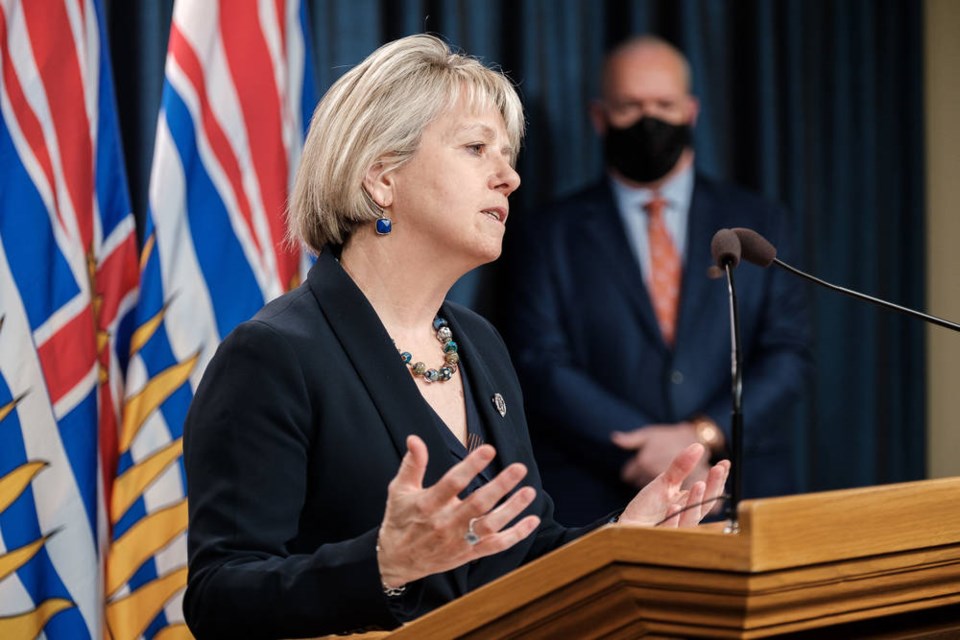B.C. confirmed 916 cases variants of concern over the past four days, as the number of cases of the P.1 strain nearly doubled.
The COVID-19 virus is constantly changing and some of the variants can spread more easily, said provincial health officer Dr. Bonnie Henry and Health Minister Adrian Dix.
“All of us are at risk, we are at risk of our loved ones getting sick and we’re at risk of getting sick ourselves,” Dix told media.
Variants of concern have been identified in 3,559 cases in B.C. to date, and the number of cases of the P.1 strain, first identified in Brazil, have jumped to 737 from 379 since Thursday. Most variant cases in B.C. are of the B.1.1.7 (U.K.) strain.
Dix said there is a “significant” amount of P.1 in the province and he expects the variants of concern to eventually replace less transmissive COVID-19 strains.
“What we know is the most transmissive varieties, the variants of COVID-19, are ultimately going to take over,” he said. “We’ve seen that in other jurisdictions and we expect to see that here.”
University of B.C. epidemiologist Daniel Coombs said the concern is not the rate of spread of the variants or which one becomes the dominant one, “it’s whether it leads it leads to more serious illness.”
Coombs, an expert in mathematical models of pandemic growth and control, said it’s not clear whether the Brazil variant outcompetes the U.K. one. “Really the concern here is, you know, if we’re going to have more people infected and if we’re going to have also a high proportion of those people going to the hospital, then that’s bad.”
Even if the hospitalization rates were to stay the same as they’ve been, the additional case counts expected over the next few weeks could cause “a significant increase in hospitalizations and ICU, which is really pretty concerning,” he said.
There are 318 individuals in hospital with COVID-19. Sixty of the people in hospital are infected with one of the variants, and 96 are in intensive care.
Dix said some Lower Mainland hospitals are feeling the pressure in intensive care units.
The average person in hospital with COVID-19 in Fraser Health, for instance, is 65 — showing that older people are more vulnerable to serious illness from the virus, he said.
At the same time, he said, there are more COVID cases in people age 20 to 29, and a higher percentage of young people are going into critical care. “We’re not seeing an increase in hospitalizations amongst young people — what we are seeing amongst those hospitalized is an increase in the number of people in critical care.”
All COVID-19 strains spread in the same way, Dix said. “That’s why the most important restriction in B.C. continues to be the restriction on socializing with people in your household indoors and the restrictions in socializing outside the house as well.”
Much of the transmission of COVID-19 and variants that B.C. is seeing now occurred prior to the newest restrictions on indoor dining and indoor group fitness, Dix said, adding those restrictions are “strong” if people follow them.
“If you don’t need to travel, don’t travel, especially in this month of April … where we’ve had a weekend of about 1,000 cases a day,” he said.
The province reported 999 new cases Sunday and 890 Monday following record high totals of 1,018 and 1,072 for Friday and Saturday, respectively. Twenty-three people with COVID-19 have died since Thursday, bringing the total to date to
There have been 247 cases in Island Health confirmed since Thursday — an average of almost 62 a day. The previous record for single-day cases in the region was 55.
To date, 893,590 doses of the Pfizer-BioNTech, Moderna and AstraZeneca vaccines have been administered and Dix expects that number to hit one million by week’s end. More than 18 per cent of the 4.3 million eligible adults in the province have received at least one dose.
The province launches its single online and telephone Get Vaccinated booking system Tuesday. As of 8 a.m., everyone 71 years and older, Indigenous peoples 18 and older, and those who have received their ‘clinically extremely vulnerable’ letter in the mail can book online, by telephone or in person at a Service B.C. location.
It takes at least 21 days for the vaccine to become fully effective, so that no one should be doing anything different immediately after being immunize, Dix said.
“And you have to continue to follow public health rules even after that,” he said. “What immunization does is it makes you safe — it doesn’t take away your obligation to follow public health rules.”
ceharnett@timescolonist.com
— With a file from The Canadian Press



